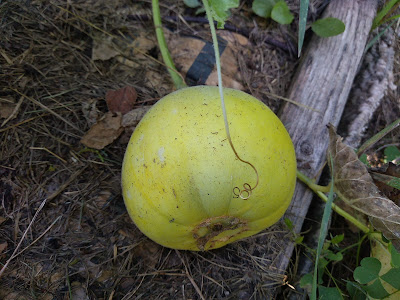It's been a tough few months to be a chicken around here, so I thought I'd bring you all up to date.
 |
Two of my favorite lap chickens, Esther (on my knee) and Charlotte (on my boot)
|
In late May, we lost Buttercup to a fox. Buttercup was the sweetest chicken, and she loved to perch on my shoulder, or anywhere else, for that matter. I feel so guilty and sad that we lost her, and especially that we lost her to a predator. It's my job to keep the chickens safe, and once again, I failed.
 |
| Buttercup |
That same day, Rocky was also taken. I saw the abduction, but didn't realize at first what had happened. When I realized, I chased the fox through the woods in my bare feet, until he let Rocky go. Rocky's wing was damaged, and I think she sustained some nerve damage as well. Rocky has since recovered enough to be able to fly up to the roost at night, and she resumed laying eggs as well, although her range of motion is a little less in the injured wing. Based on feather evidence, we think a fox must have gotten close to Koko as well on that day, but she returned to the coop at dusk, and seemed traumatized, but physically OK.
I didn't let the girls out on their own for a couple of weeks. But foxes are nocturnal, doing most of their hunting at night. They're active at dawn and dusk too, but generally not in the middle of the day. Plus, I hadn't seen a fox since the end of May. So in mid-June, I let the girls out by themselves for about an hour in the middle of the day, figuring they'd be safe. Koko was taken. I did see a fox later that afternoon, so I assume she was taken by a fox, but we didn't find any feathers, so it could have been an aerial predator. Koko was clever, a consistent layer, and friendly. Although I tried, she never did take to being a lap chicken.
 |
| Koko |
Yeah, so no more letting chickens out by themselves. Ever. I also make a point to listen to podcasts at full volume when I'm out there supervising their ranging--most ground predators will stay away from human sounds.
Last week, Indigo died in her sleep. She was moving slow, and hadn't been able to hop up to the roost for a while, so her death wasn't really a surprise, but it was still unexpected. She's buried under a tree. Indigo was such a gorgeous bird, curious, and sweet.
 |
| Indigo |
During this time, Charlotte decided to go broody three times. Going broody means a chicken wants to incubate eggs--she wants to be a mama. If I had been making a list of chickens I thought would go broody, Charlotte would have been at the very bottom. We don't have a rooster, so no matter how long a chicken sits on any of our eggs, she will not hatch chicks. But chickens, their hormones just take over, I guess, and they will continue to sit on eggs until they hatch. The broody hens only get up for about an hour a day, which means they don't get as much food or water as they should for those three weeks, and since our eggs will never hatch, being broody in our flock is potentially fatal.
 |
Charlotte. About double her normal size.
Chickens fluff up their feathers when they're broody. |
Each time, I ended up putting Charlotte into the chick grow out pen with food and water. The idea is to put the chicken in a situation where she can't sit on eggs, and eventually she'll lose interest. Charlotte didn't have a nest and didn't have any eggs, so eventually she decided she didn't want to be a mama anymore. At least for a couple of weeks...
 |
Rocky, Toasty, Esther, Charlotte
Dust bathing |
Three of the girls are molting. Esther is growing feathers, and Charlotte and Rocky are losing feathers. Toasty has stopped laying eggs, so I think she might be preparing for a molt as well. It's early for them, but it's so much more sensible, I think, to lose and regrow one's feathers when it's 85 or 90°F rather than <32°F.
 |
| My hammock buddy, Esther |
So that's the update. It's been a tough couple of months to be a chicken mama around here, too.

























